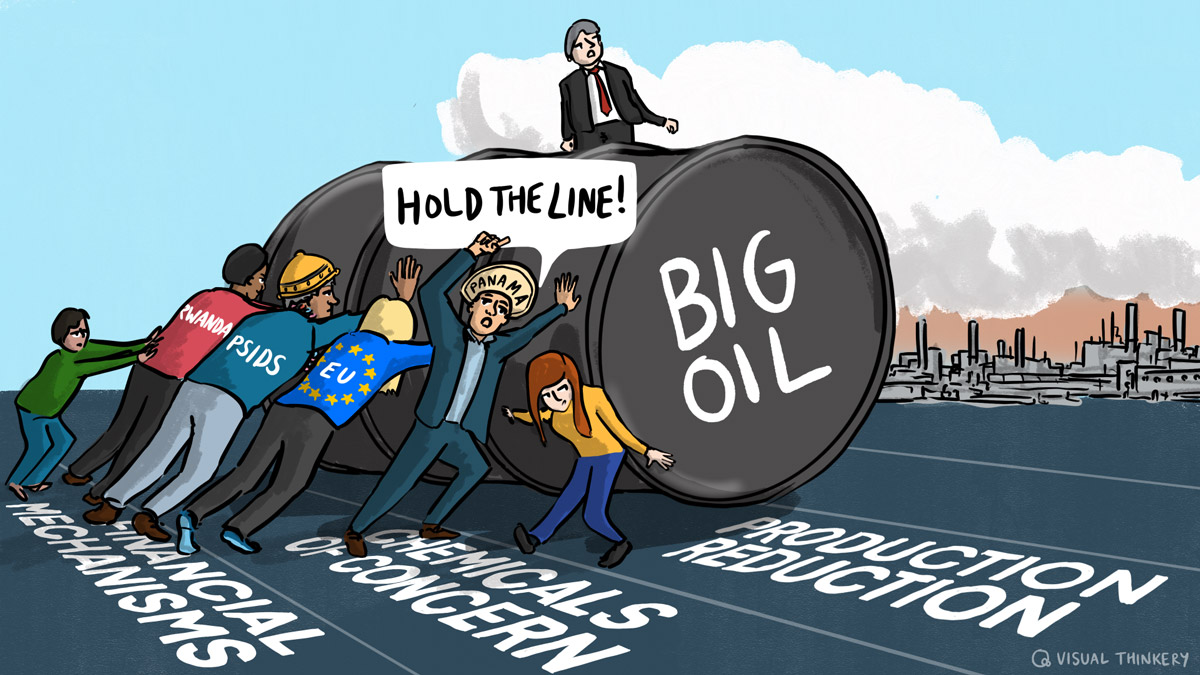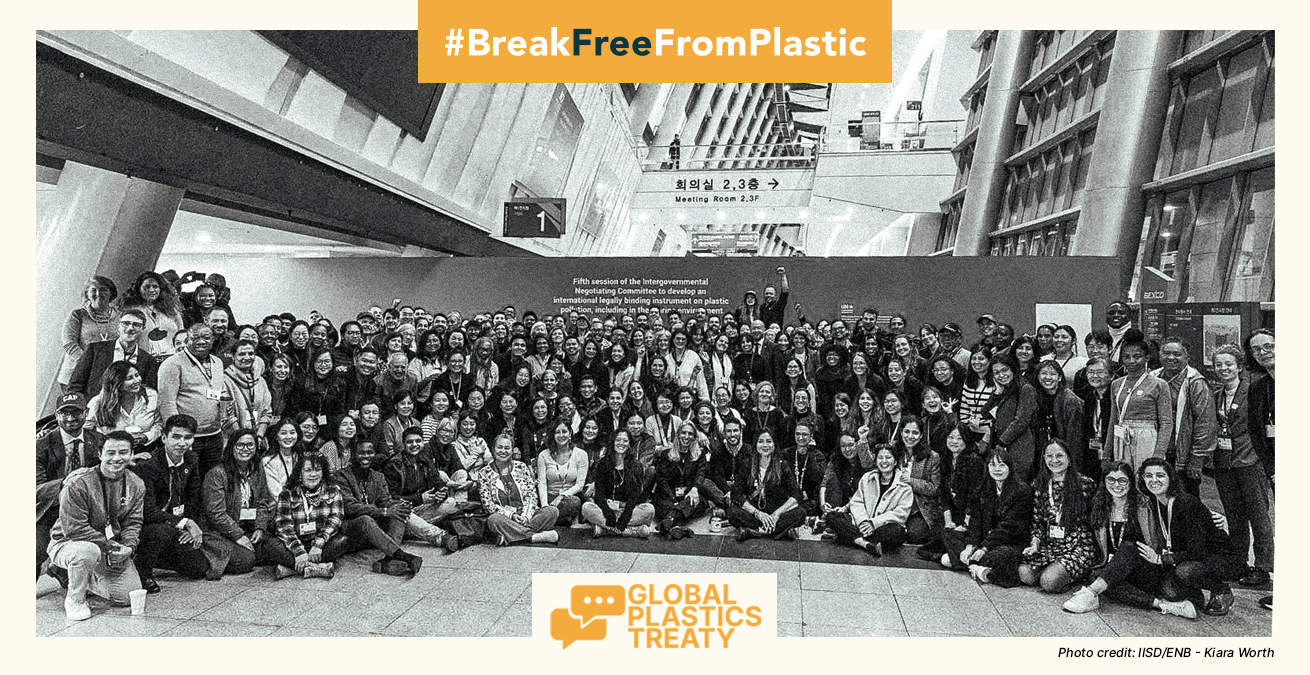Busan, Republic of Korea — December 02, 2024 — Break Free from Plastic members today reaffirmed their commitment to continue pushing for a strong and ambitious global plastics treaty following the stalling of negotiations in Busan, supporting the majority of countries standing up for ambition.
The fifth meeting of the Intergovernmental Negotiating Committee (INC-5) for a global agreement to end plastic pollution concluded today without an agreement, leaving countries with an extended deadline and a proposal by the Chair to resume talks at an extra session (INC 5.2) to resolve outstanding disagreements. Countries will use the latest Chair’s text for the resumed session as the basis for the continued negotiations. The Chair reminded delegates that the whole text is still subject to negotiations.
Progress derailed by unresolved disagreements
Civil society observers and organizations expressed concern that, while the negotiations will continue with an additional session, the process remains at risk of being undermined by the self-serving interests of petrostates and fossil fuel companies, which have hindered progress on climate change and are now attempting to do the same on the plastics crisis.
Civil society groups attributed the delays in negotiations to resistance and derailing tactics mainly from oil-producing countries, which have led to unresolved disagreements on critical provisions. These provisions include production cuts, the elimination of the most harmful plastic products and chemicals of concern, and the setting up of an adequate financing mechanism to support effective implementation of the treaty, notably in developing countries.
Growing support for an ambitious treaty
During the closing plenary session, Rwanda, representing 85 countries, emphasized that they will remain steadfast in their pursuit of a comprehensive and ambitious agreement. In response to Rwanda's call to “stand up for ambition,” hundreds of delegates and observers rose from their chairs to express shared hope for a strong Global Plastics Treaty now. The thunderous applause that followed indicated just how much support there is for a more ambitious treaty.
Most countries have shown their support for a proposal led by Panama for a comprehensive strategy to reduce global plastic production through a systematic, adaptive approach with a global target addressing the entire plastics lifecycle. Yet, despite this unity, the talks were held back by a few resistant voices. Observers witnessed how, due to the disproportionate power of fossil fuel and petrochemical lobbyists, the interests of a select few were prioritized over the long-term health and well-being of people and the planet.
Compromised participation, compromised text
The entire INC process — from INC 1 through INC-5 — has been discriminatory, exclusionary, and lacked transparency. Rightsholders, including those most impacted by plastic pollution, were virtually excluded from most of the negotiations. With only a few interventions dedicated to observers' interventions during the whole week of negotiations, unsurprisingly, the two proposed texts provided by the INC Chair Luis Vayas Valdivieso did not reflect the priorities of those most impacted by and shut out of the negotiations.
In the current text, there is no direct mention of the rights of Indigenous Peoples. Likewise, the current text does not list chemicals of concern, nor does it include direct obligations, criteria, and transparency provisions, among other red lines that cannot be crossed without perpetuating the harms of plastic pollution, especially on frontline communities. Additionally, many observers noted that the current text has too many options, weak language, and a lack of clear definitions.
Despite the barriers to participation, throughout the week, civil society organizations, including Indigenous Peoples, waste pickers, fenceline and frontline communities, women, global citizens, and scientists stood united in their ambition for a legally binding instrument to end plastic pollution across its lifecycle as set out in the UNEA Resolution 5/14, and calling on countries to show ‘courage, not compromise,’ which most countries did.
Break Free From Plastic members reactions:
Yuna Lee, Our Sea of East Asia Network (Republic of Korea), said:
“What we witnessed today was not merely a power struggle. The outcome of the closed-door meetings among member states revealed a profound failure of consensus-based multilateralism, a collapse of collective intelligence, a glaring lack of political will from certain world leaders, the prioritization of capital over human rights, the theft of language cherished by human rights advocates, and the distortion of scientific evidence for political gain. While some hold the health and rights of humanity and the environment hostage, we remain united, refusing to turn away from the escalating plastic crisis that demands urgent action.”
Larisa de Orbe, Colectiva Malditos Plásticos, (México) said:
“We see with anger how the greed of some is determined to block the proposals of courageous countries that want to move toward a better future. We hope that more and more voices will continue to shout and demand that the best decisions are taken and that our governments fulfill their duty to protect the health of this planet.”
Jules Vagner, Objectif Zéro Plastique (France), said:
"As volunteer observers, we came to Busan with high hopes and a clear goal: a 75% cut in plastic production. We are heartened that 110 countries agreed on the need to reduce production, but this progress comes amidst significant setbacks. We were excluded from the negotiations, a process dominated by oil-producing states and their allies. The consensus model continues to benefit low-ambition petro-states, stalling progress and jeopardizing the treaty’s effectiveness."
Salisa Traipipitsiriwat, Environment Justice Foundation (Thailand), said:
“To ignore the need to reduce plastic production is to deny science itself. Nearly 94% of greenhouse gas emissions in the plastic life cycle come from the extraction and production stages alone. Plastic pollution is not just an environmental crisis—it’s a threat to human lives, ecosystems, and climate stability. We need collective action, with experts from diverse fields working together to solve this crisis. Yet at INC-5, observers were shut out, expertise was sidelined, and critical voices went unheard. The failure is not due to the complexity of the problem, but because those with solutions were excluded from the room.”
Matt Peryman, Aotearoa Plastic Pollution Alliance (Aotearoa / New Zealand), said:
“Indigenous Peoples and our Rights as enshrined in UNDRIP have been consistently violated by the entire INC process. The Chair’s failure to effectively facilitate negotiations for a just and equitable plastics treaty has brought us down a dead-end path, perpetuating harm to the most impacted frontline and fenceline communities, who have been flagrantly excluded throughout negotiations. To see our Indigenous Knowledge systems appropriated into the treaty text while our human rights and participation are not is insulting. This is why we need to be at the table; we can’t rely on Member States to advocate for us.”
Maro Kakoussian, Coalition Member, Environmental Justice Communities Against Plastic Coalition (USA), said:
“As a coalition representing environmental justice communities in California who are disproportionately impacted by the lifecycle of plastics from extraction to disposal, we are participating in the INC process to support calls for a treaty that centers the lived experiences of communities most harmed globally. However, as it stands, this treaty fails to serve our needs as it will not meaningfully reduce plastic production, will not uphold our human right to health - especially for women and children, and will not reject false solutions. Despite our disappointment, we are grateful for the global solidarity that has been built and will remain united with our allies until environmental justice is realized.”
John Chweya, President of Kenya Waste Pickers Welfare Association (Kenya), said:
“Missing the mandatory language in the Just Transition article is a setback for us for we risk being overlooked in the implementation of systems geared towards ending plastic pollution. In doing so, waste pickers and other vulnerable frontline communities would then not have realized justice in this treaty."
Aeshnina Aqilani, River Warrior Indonesia and BFFP Youth Ambassador (Indonesia), said:
“When ambitious countries refuse to accept a weak treaty, our movement stands with them! We are committed to ending plastic pollution… We remain hopeful, and your decision here to extend the process gives us hope that you will still deliver the treaty that the world and my generation needs. As you continue this historic process, we urge you to listen to us, hear our voices, and most importantly do the right thing. We are counting on you to make a real difference in ensuring a fair and better future for us all.”
Break Free From Plastic members leave Busan with a higher ambition and continued commitment to their communities and a future free from plastic pollution.
More quotes from different regions and in different languages are available here.

###
Notes to the editor
- More quotes from different regions and in different languages are available here.
- Translations of this PR are available here
- Photos and videos are available here
- Cartoons available here
- POPLites Daily INC-5 Summaries here (available in 13 languages)
About BFFP — #BreakFreeFromPlastic is a global movement envisioning a future free from plastic pollution. Since its launch in 2016, more than 3,400 organizations and 14,000 individual supporters from across the world have joined the movement to demand massive reductions in single-use plastics and push for lasting solutions to the plastic pollution crisis. BFFP member organizations and individuals share the values of environmental protection and social justice and work together through a holistic approach to bring about systemic change. This means tackling plastic pollution across the whole plastics value chain – from extraction to disposal – focusing on prevention rather than cure and providing effective solutions. www.breakfreefromplastic.org.
Global Press Contacts:
- Caro Gonzalez | Caro@breakfreefromplastic.org
- news@breakfreefromplastic.org
Regional Press Contacts:
- United States and Canada: Brett Nadrich | Brett@breakfreefromplastic.org
- Africa: Carissa Marnce | Carissa@no-burn.org
- Asia Pacific: Eah Antonio | Eah@breakfreefromplastic.org
- Asia Pacific - South Asia: Devayani Khare | devayani@breakfreefromplastic.org
- Europe: Bethany Spendlove Keeley | Bethany@breakfreefromplastic.org
- Latin America: Camila Aguilera | Camila@no-burn.org




